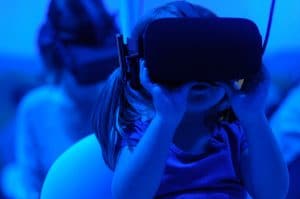Twenty-five years ago, most people didn’t imagine that the Internet would reshape the way that they existed on a day-to-day basis. Twenty-five years from now, people will think about Virtual Reality the same way we think about the Internet today: we won’t even be able to imagine our global existence without it. One of the largest beneficiaries of this technological development could be the global church, because VR is going to change the way that Christians participate in worship.

The main impact that VR is going to have on the global church is that it is going to, one day, enable Christians to easily gather from a variety of places without being in the same physical location. This will enable persons who are homebound, sick, caregivers, without transportation, on vacation, or severely disabled to participate in worship with the larger community of faith without needing to leave the place where they are physically residing.
Eventually, VR technology will allow these participants to feel fully immersed as if they are actually physically present. It will also allow them to participate virtually in ways that they may not be able to in their present reality. No longer will one’s lack of physical ableness be a deterrent that keeps people from ushering or serving communion. Folks will be able to perform these tasks from afar. Congregants who participate via VR will tithe and partake in the sacraments digitally. Of course this means that, particularly with regard to the sacraments, many ecclesiastical traditions will need to do the theological work of reimagining how modern developments in science and technology inform our understanding of sacramentality with regard to particulate matter.
But before society is exposed to fully immersive VR, it is likely that most congregations will transition between VR and their present reality by utilizing Augmented Reality. The benefits of using AR in worship would be that a congregant who is sitting in a church in our present reality could view participating VR congregants by wearing Magic Leap (or some equivalent) eyeglasses, contacts, or implanted lenses. So, even though to the naked eye many pews may look empty, when viewed with AR, the congregation may actually prove to be more full than ever.
If this renewed sense of community is properly embraced, it has the potential to create a revival in church participation that has never before been seen in the history of the global church. Millions of people who have been disenfranchised from the church because of physical constraints will now be empowered to participate fully via virtual reality in worship and fellowship. At the same time, congregants who still seek the holiness that is found through the physicality of God’s creation in our present reality will also be able to fully engage with those VR participants via their augmented reality wearables and enhancements. For these and the aforementioned reasons, tech-savvy churches should begin to seriously investigate these exponentially advancing technologies now.
Of course this means that, particularly with regard to the sacraments, many ecclesiastical traditions will need to do the theological work of reimagining how modern developments in science and technology inform our understanding of sacramentality with regard to particulate matter.
It is also of significance that with the development of VR and AR will come moral and ethical temptations that have never before existed in the history of humanity. The church universal has a spiritual responsibility to model behavior when it comes to the uses of new technology. As such, the global church must not delay in charging its congregants who are, by vocation, scientists and technologists to actively engage in developing these new technologies in ways that will work towards advancing Christ’s redemptive purposes for humanity and the world. Not to do so would be poor stewardship of the gifts that God has given us through technological advancement that can help to advance the global church in Christ’s Kingdom purposes.
Reality Changing Observations:
1. In what ways do you think that Virtual Reality could possibly aid people that were previously underserved?
2. How do you think VR will change the dynamics of worship?
3. How do you think VR will positively or negatively impact the future of the Christian church?





